You swear you can’t live without him. And he is faithfully sworn to your happiness. He doesn’t check a damn thing off your honey-do list, and you couldn’t care less. You’re happy to swap poop-scooping and fur on…well, everything…for the unconditional love and uncomplicated companionship. You may even have one of the best emotional support dog breeds for anxiety and depression and not know it. Lucky you!
For many people, dogs are more than pets—they’re part of their Anxiety Therapy in Canton, offering comfort, grounding, and a sense of calm when life feels overwhelming.
We’ve all seen the memes – and may even own the t-shirt by now: “I love dogs, (insert other interest), and maybe three people.”
Slap a heart emoji on that one because oh, how we all understand and agree!
In fact, we understand and agree so much that the preference for dog company over human company rarely fazes us, even when we’re the competition!
Overview
Given the choice between a human and canine, plenty of people would choose to keep company with a dog. Any day. Paws down.

Dogs are, after all, less complicated to live with than most humans.
They don’t weigh down your relationship with a bunch of emotional drama. And their presence can be a natural antidote to human-created stress.

Toss in the cuteness, cuddliness, manipulative eyes, gratis entertainment, and gift of living in the moment, and the preference is understandable.
It’s no wonder humans have come to their senses, bringing their furry friends in from the doghouse and onto the furniture.
Beyond companionship and love, however, some dogs provide something extra. Something indispensable. Something potentially life-saving.
Depending on their owners’ needs, some dogs take on very specific service and support roles.
While any breed can get the part, some breeds are, in general, a more natural fit.
For individuals struggling with mood-related conditions, emotional support dogs can complement formal depression treatment in Canton, offering comfort and a sense of calm during difficult times.
After distinguishing between service dogs and emotional support dogs, we’ll look at the best emotional support dog breeds for anxiety and depression.
Are service dogs the same as emotional support dogs?
Emotional support animals (ESAs) — emotional support dogs (ESDs) included — are not the same as service animals.
(For a beautiful story about service dogs and their human counterparts, check out “Pick of the Litter.”)
Service animals, most often dogs, have specific jobs to do. And they go through extensive behavior and task-specific training to meet the call.
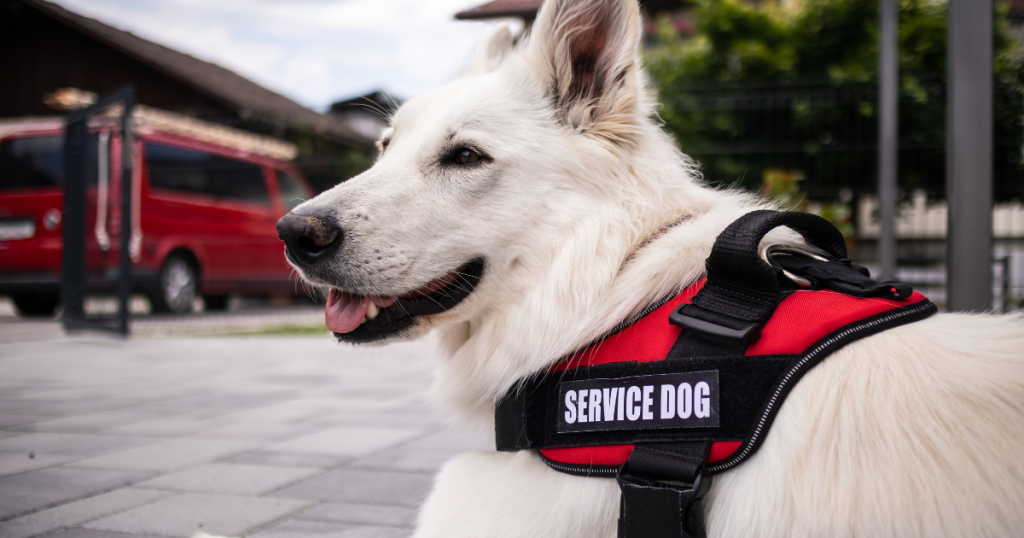
They are responsible for helping their handlers, who may have mobility issues, medical alert needs, or a health condition such as diabetes, severe allergies, or multiple sclerosis.
Visual assistant service dogs (aka guide dogs), for example, have been helping people with blindness or sight impairment since 1929.
The United States Department of Housing and Urban Development requires special training for service dogs, but not for emotional support dogs.
(Basic behavior and obedience training is a logical recommendation for any non-regulated, non-certified animal that serves its human in a supportive capacity. Heck, it’s just basic good sense for any dog.)
An ESD may not have the training or designated job of a service dog. But its value to its owner is equally impactful.
And the relationship between an ESD and its owner is one of deep connection and inter-reliance..
ESDs enhance quality of life in ways that are difficult to put into words.
Dogs may be the most popular emotional support animal. But they don’t own the market on assuaging the effects of anxiety and depression.
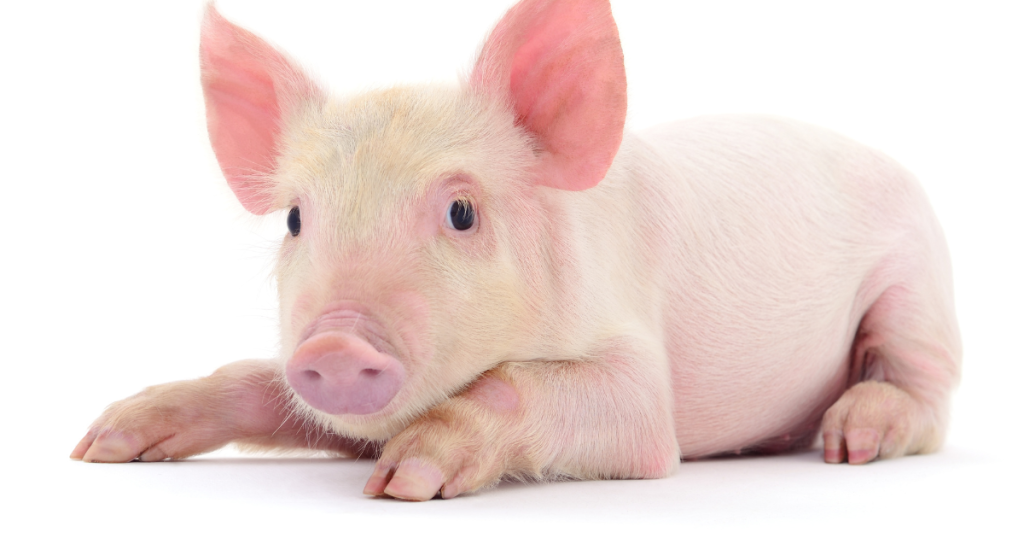
Practically any domesticated animal can qualify to provide emotional support – cats, hedgehogs, teacup pigs, miniature horses, rabbits, hedgehogs, mice, even (yes) snakes.
While any dog can be an ESD, some are consistently the best emotional support dog breeds for anxiety and depression.
What is the definition of an emotional support dog?

ESDs provide therapeutic benefits, including anxiety relief, companionship, and comfort. The intensely loving and devoted bond they have with their humans provides emotional stability their humans would otherwise struggle to maintain.
When suffering from anxiety, depression, and/or some other mental health issue, the support of an ESD can be invaluable.
There is no required training for ESDs. They are ‘prescribed’ by a licensed mental health provider as part of the process outlined here.
Even though all dogs can offer support, the best emotional support dog breeds for anxiety and depression have traits that make them well suited for the role.
These breeds tend to be gentle, laid-back, and sociable. They’re also highly trainable and are all about pleasing their human friend/owner.
Let’s explore some of the specific ways ESDs help their human beneficiaries.
Here are 4 benefits of emotional support dogs for people with anxiety and depression:
1. Improved Sleep
ESDs can help you sleep by providing a sense of security to help you fall asleep and stay asleep.
With anxiety or depression, sleep is often dysregulated. And sleep problems only worsen mental health symptoms.
2. Emotion Regulation
ESDs help their humans recognize and regulate feelings more effectively.
Emotions are less likely to take over and overwhelm the human when the ESD senses a potential upset or intervenes during an upset.
3. Socialization
ESDs can help their humans make connections with other people, such as when taking a walk together or spending time in a dog park.
Conversations tend to be easier when dogs are involved, especially when it comes to starting conversations.
4. Daily Routine
ESDs help people be more engaged in their own lives and have a sense of purpose.
They give their humans a loving reason to wake up in the morning — “Feed me! Pet me! Walk me! Play with me!”
What size dog is best?
Any size dog can make a great ESD. After all, physical size has no bearing on the love, comfort, and support that pour out of a pure heart.
But certain breeds have a predisposition to better temperament, trainability, and obedience.
There are pros and cons to having a small or large ESD.
Small ESDs are a great choice for people who live in cramped spaces such as apartments.
They are also easier to travel with, in part because of airline and other transportation restrictions.
If you love having a perpetual lap dog, a small ESD will probably serve your needs better than, say, a Great Dane.
But then, doesn’t every dog think it’s a lap dog?
Certain traits, dispositions, and genetic tendencies will help you narrow down your options when choosing an emotional support dog breed.
Medium to large ESDs are an excellent choice for people who have more living space and maybe even a yard.
They may also be more of a deterrent to unwelcome attention (such as an intruder, bully, or thief) than a smaller dog.
Understanding your own personality, lifestyle, and needs is essential to creating this indissoluble match.
A larger, more energetic dog breed, for example, may inspire you — even out of necessity — to get back into exercise.
Scenic hikes, jogging, kayaking, even dog-oriented activities like agility, dock-diving, and flyball. The physical engagement will mean a healthier body (for both of you), with the added benefit of endorphins for a healthier mind.
Key criteria to consider include temperament, energy level, and shedding. (But seriously, isn’t dog hair just a badge of honor?)
Here are 13 small emotional support dog breeds for anxiety and depression:
1. Chihuahuas (long-haired or short-haired)
The Chihuahua is the world’s smallest dog breed, known for its big personality and loyal nature. Originating from Mexico, Chihuahuas are alert, energetic, and often form strong bonds with their owners. Despite their tiny size, they have a bold and confident attitude. With a lifespan of 12–20 years, they make excellent companions for individuals and families alike. Available in both short and long coat varieties, Chihuahuas thrive in indoor living and love being the center of attention.
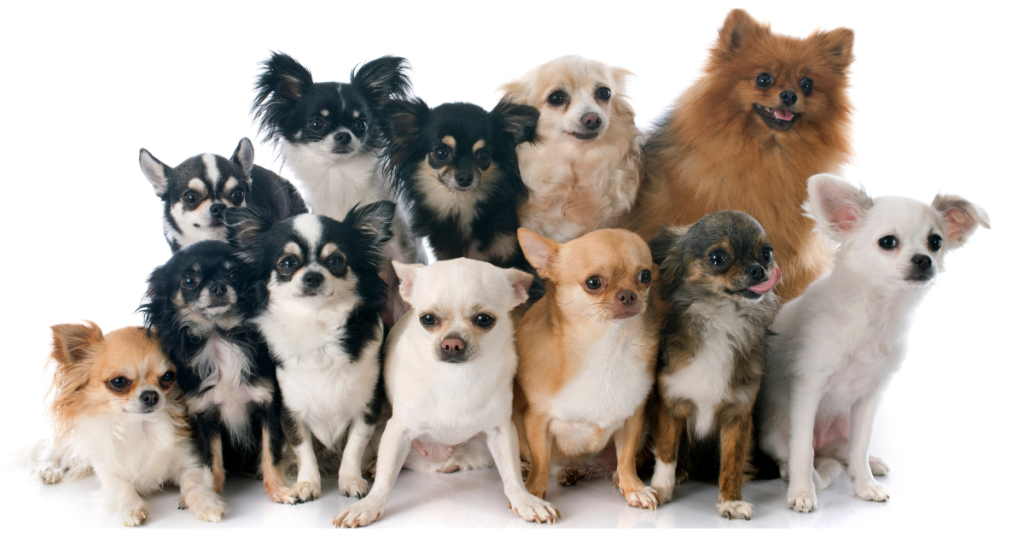
Pros:
- WaWa’s are are kid-friendly.
- With enough exercise and interaction, they calm down and adapt to a new setting.
- They have a long life span (12-20 years).
- They’re confident, loyal and outgoing.
Cons:
- Chihuahuas can be nippy, yappy, and feisty.
- Both short- and long-hair Chihuahuas shed, usually in the spring and fall.
2. Poodles Poodles come in 3 AKC sizes: Toy, Miniature, and Standard.
Poodles are highly intelligent and graceful dogs, known for their curly coats and proud posture. Originally bred in Germany as water retrievers, they come in three sizes: Standard, Miniature, and Toy. Poodles are quick learners, making them excellent at obedience and agility. Their hypoallergenic coat is a favorite among allergy sufferers, though it requires regular grooming. Friendly, loyal, and full of energy, Poodles make wonderful companions for both families and individuals.
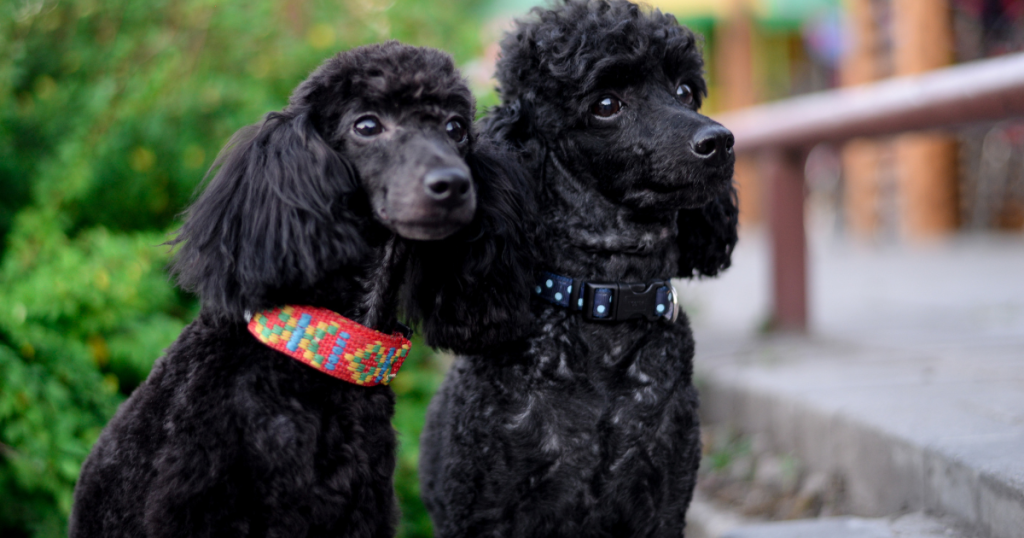
There is also a medium-sized ‘tweener, the Moyen Poodle, for your sizing convenience.
Pros:
- Poodles are super intelligent and trainable.
- They respond well to learning new tricks.
- They’re active.
- And yea! they don’t shed.
Cons:
- Even non-shedders need regular grooming. But then, don’t we all?
- They need space to move around and expend energy.
3. Cavalier King Charles Spaniel
The Cavalier King Charles Spaniel is a small, elegant toy breed known for its affectionate nature and expressive eyes. Originally bred as a companion to royalty, this dog thrives on human connection and loves to cuddle. Friendly with children and other pets, Cavaliers are adaptable, whether living in a city apartment or a countryside home. Their silky, feathered coat and cheerful personality make them a favorite among dog lovers seeking a loyal and gentle companion.
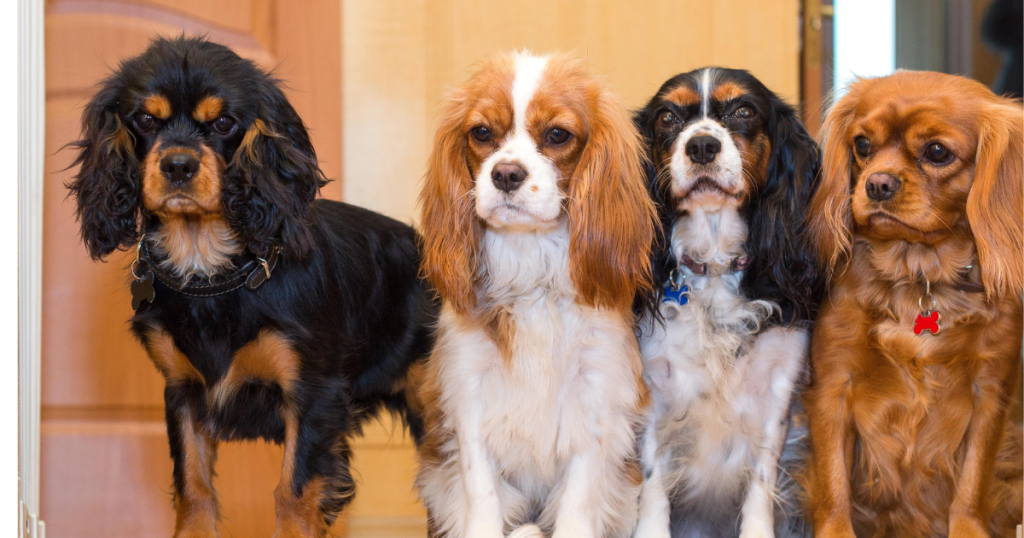
Also called the English Toy Spaniel, the Cavalier King Charles Spaniel has an interesting history..
Pros:
- They have a sweet temperament.
- They love to cuddle in your lap and snuggle on pillows.
- They’re gentle, friendly, and playful.
- This breed is polite to people and gets along well with dogs and cats.
- They are eager to please.
- Their adorable ears and eyes provide positive vibes, especially if you’re sad.
Cons:
- They shed heavily. (Your coats, couch, and sheets can attest to this!)
- They may be timid.
- As for their energy level, they love their walks and any chance to run, chase, and fetch.
4. Corgis
Corgis are charming, short-legged dogs known for their playful personalities and strong herding instincts. Originally bred in Wales, there are two main types: the Pembroke Welsh Corgi and the Cardigan Welsh Corgi. Corgis are intelligent, affectionate, and surprisingly athletic, despite their small stature. With their signature big ears and expressive eyes, they are beloved family pets and make excellent watchdogs. Corgis thrive on attention and enjoy both playtime and cuddles, making them delightful companions.

These low-riders were originally bred for farming and herding sheep.
Pros:
- They’re intelligent, alert, and protective of their owner. (No wonder Her Majesty collects them like crowned jewels.)
- They have a friendly, affectionate, and obedient temperament/personality.
- They’re light hearted and especially helpful for people with anxiety.
Cons:
- This breed requires a lot of exercise due to their innate herding instinct.
- They shed heavily.
5. Pugs
Pugs are small, sturdy dogs known for their wrinkled faces, curly tails, and lovable personalities. Originating from China, this ancient breed is a favorite for its affectionate nature and playful spirit. Pugs thrive on human companionship and are known to be great with kids and other pets. Despite their laid-back attitude, they have a mischievous streak that adds to their charm. With their expressive eyes and endearing snorts, Pugs bring laughter and warmth to any home.
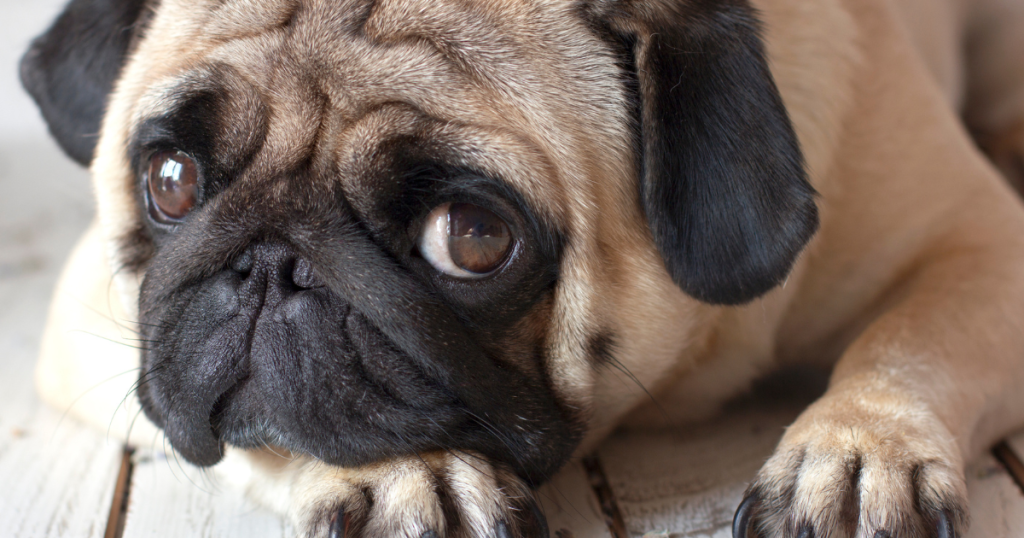
Pros:
- Pugs have many human-like expressions, including surprise and happiness.
- They’re versatile and get along well with children and seniors.
- They adapt well to both urban and rural settings.
- They’re affectionate.
- Playful antics are a specialty.
- Pugs have a lot of energy and enjoy running outside.
- They tend to be curious about things and people.
- Yea! for very little shedding!
Cons:
- Training them is important so they know how to calm down.
- Some people rule them out because of their facial features.
- They can be mischievous.
6. Dachshunds
Dachshunds, also known as “wiener dogs” or “sausage dogs,” are easily recognized by their long bodies and short legs. Originally bred in Germany to hunt badgers, they are courageous, clever, and full of personality. Available in standard and miniature sizes, and in smooth, longhaired, or wirehaired coats, Dachshunds are playful companions with a strong sense of loyalty. Despite their small size, they have a big bark and love to explore. With the right care and attention, they make lively and loving pets.

Dachshunds were bred to hunt animals that burrow, such as badgers and rabbits. Their short legs help them quickly hunt in narrow tunnels.
Pros:
- “Weiner dogs” are highly trainable.
- They’re affectionate, playful, and friendly.
- Dachshunds are an excellent family companion.
- They have a lot of stamina and energy.
- Besides daily walks, they love playing outdoors with other dogs, digging holes in the yard, and hunting.
Cons:
- Training your Dachshund in obedience before taking it to parks is especially important
- They need to be brushed regularly and have their ears cleaned weekly.
- Fungi, bacteria, and mites hide in their droopy ears.
- They can be stubborn at first.
- They hunt and dig holes, which can be problematic.
7. Yorkshire Terriers (“Yorkies”)
Yorkshire Terriers, or “Yorkies,” are small but bold dogs known for their silky, floor-length coats and confident personalities. Originally bred in England to catch rats in textile mills, they’ve become beloved companion dogs. Yorkies are energetic, intelligent, and fiercely loyal to their owners. Despite their dainty appearance, they have a feisty, adventurous nature and enjoy being the center of attention. With proper care and affection, Yorkies make devoted and lively companions in any home.
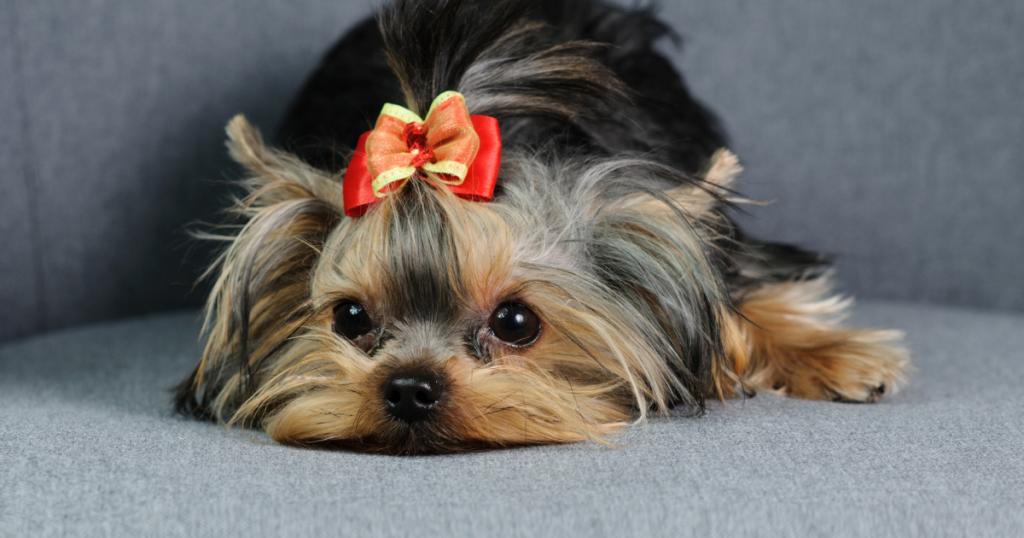
They’re small with enormous personalities!
Pros:
- They’re small and portable.
- They fit into small spaces easily and are good travel companions, especially on an airplane.
- They are trainable and sensitive to dangers.
- Their coat is long and silky, but doesn’t tend to shed.
- Despite their small size, they love to chase, play, and pounce.
- They’re considered curious, affectionate, and brave.
Cons:
- They yap and bark at unfamiliar and suspicious sounds.
- Their coat grows fast and requires regular trimming and constant brushing.
- They need to be walked and played with everyday.
- Their small size may make them easy to accidentally step on.
8. Bichon Frises
Bichon Frises are small, white, cloud-like dogs known for their cheerful personalities and hypoallergenic coats. Originating from the Mediterranean, they were once popular among French royalty and continue to charm with their affectionate and playful nature. Bichons are friendly, social, and love being around people, making them excellent family pets. Their soft, curly coats require regular grooming, but their lovable nature and joyful spirit make every effort worthwhile.
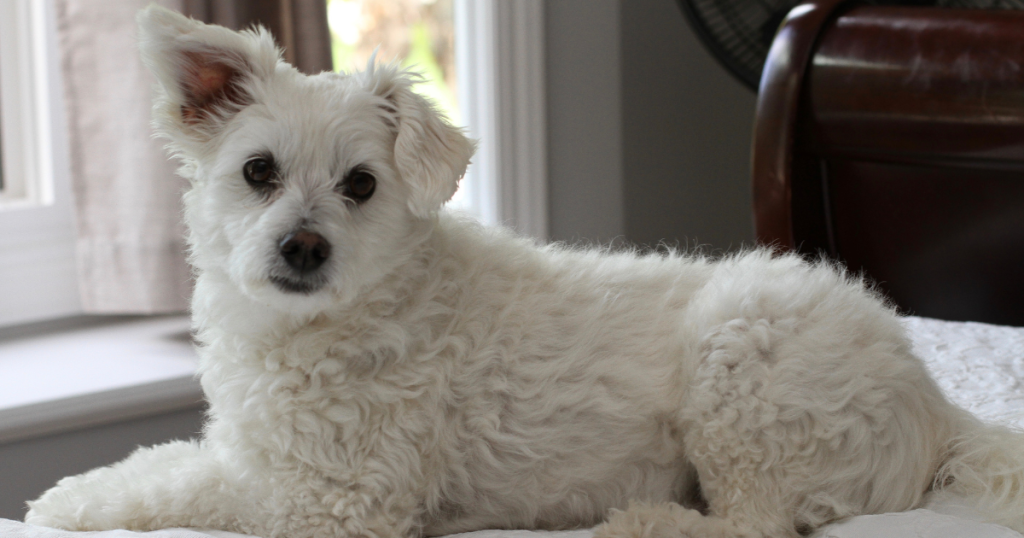
Pros:
- Their fur is plushy and hypoallergenic – like a giant cotton ball!
- Bichons tend to be easy-going and intelligent.
- They’re alert to strangers and are great watchdogs.
- They are curious, confident, and warm.
- They love to stay by your side.
- Bichons shed little and should be brushed two to three times a week.
Cons:
- Their fur is all white. Just a heads-up to you mud puddles out there….
- They resemble miniature poodles, which is a ‘con’ if you don’t like the poodle look.
- They’re energetic and need daily exercise.
Often the same pros and cons are consistent across many breeds. And who/what determines the pros and cons in the first place is subjective.
What are some of the best medium-large emotional support dog breeds?
9. Golden Retrievers
Golden Retrievers are one of the most popular dog breeds in the world, known for their friendly temperament, intelligence, and loyalty. Originally bred in Scotland as hunting companions, Goldens excel in obedience, service work, and as loving family pets. They are gentle with children, get along well with other animals, and thrive on human companionship. With their golden coats, playful energy, and eager-to-please attitude, Golden Retrievers are both beautiful and dependable companions.
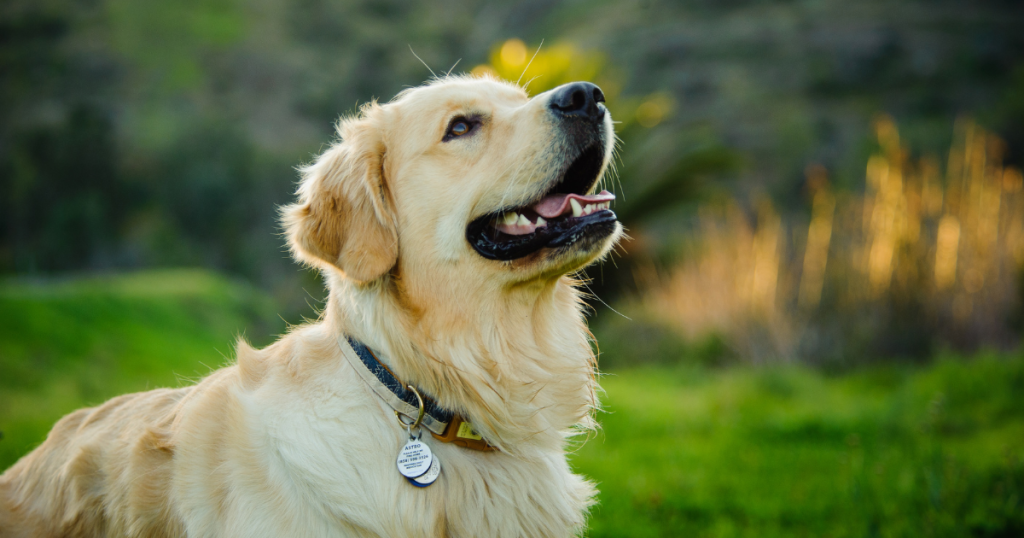
Pros:
- This breed is known for its friendliness, kindness, and ability to bond well.
- Golden retrievers are even-tempered and well-mannered.
- Goldens like to retrieve things. For this reason, they also make fantastic service dogs.”Bring the phone! Bring my meds!” Goldie is all about “Your wish is my command.”
- They’re very huggable! (I think loving Goldens is a criterion for being human. Just a hunch.)
- This breed expects to be treated like a family member and not ignored. (And the issue would beee…?)
Cons:
- Goldens shed a lot.
- They are prone to hip problems and skin issues.
- They require considerable exercise.
- Goldens have one of the highest cancer rates in the dog world.
10. Labrador Retriever
Labrador Retrievers are beloved for their friendly nature, intelligence, and versatility. Originally bred in Newfoundland as fishing and hunting companions, Labs have become one of the most popular dog breeds worldwide. They are highly trainable, eager to please, and great with families, children, and other pets. Labs come in three colors—black, yellow, and chocolate—and are known for their love of water and outdoor adventures. Whether as service dogs, hunting partners, or playful family pets, Labradors shine in every role.
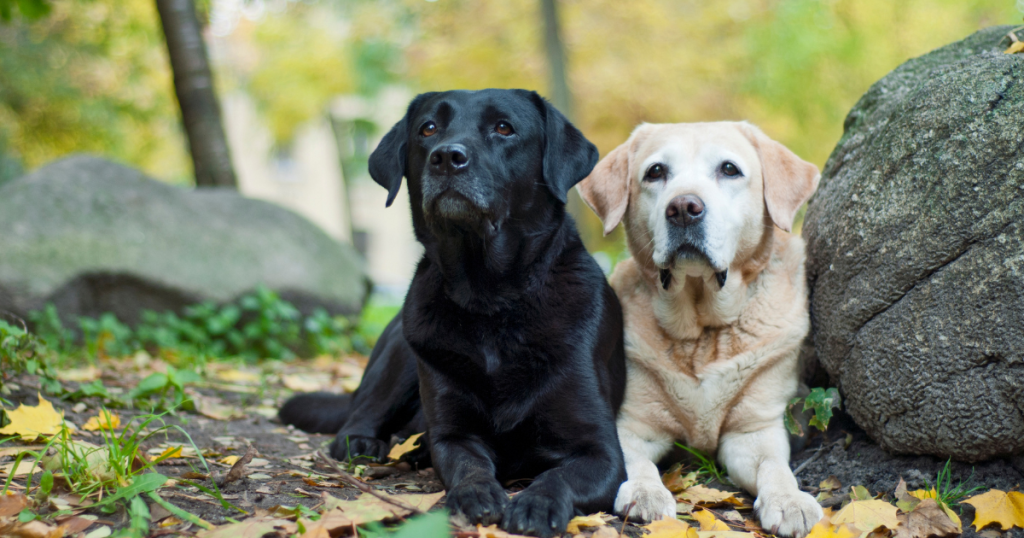
Pros:
- The National Institute of Health identifies these dogs as particularly well-suited to contribute to happiness and reduce depression.
- Labradors are among the best dog breeds for anxiety sufferers because they’re cheerful and even-tempered.
- Labrador Retrievers are intelligent and easily trained, and they remain responsive and calm during training.
- They love consistency.
- They’re often used as guide dogs for the visually impaired because they easily pick up daily routines.
- Labs love to please their owners.
Cons:
- They have a lot of energy and require daily exercise.
- Labs are highly food-motivated, so have dog treats easily accessible (for you to access, not them).
- They love to kiss you – and usually sloppily!
- They’re quite energetic.
11. Irish Wolfhounds
Irish Wolfhounds are one of the tallest dog breeds in the world, known for their impressive size and gentle temperament. Originally bred in Ireland for hunting wolves and large game, these majestic dogs combine strength with kindness and loyalty. Despite their towering stature, Irish Wolfhounds are calm, affectionate, and great with families and children. They have a wiry coat that requires regular grooming and thrive in spacious environments where they can roam. With their noble presence and loving nature, Irish Wolfhounds make devoted companions.
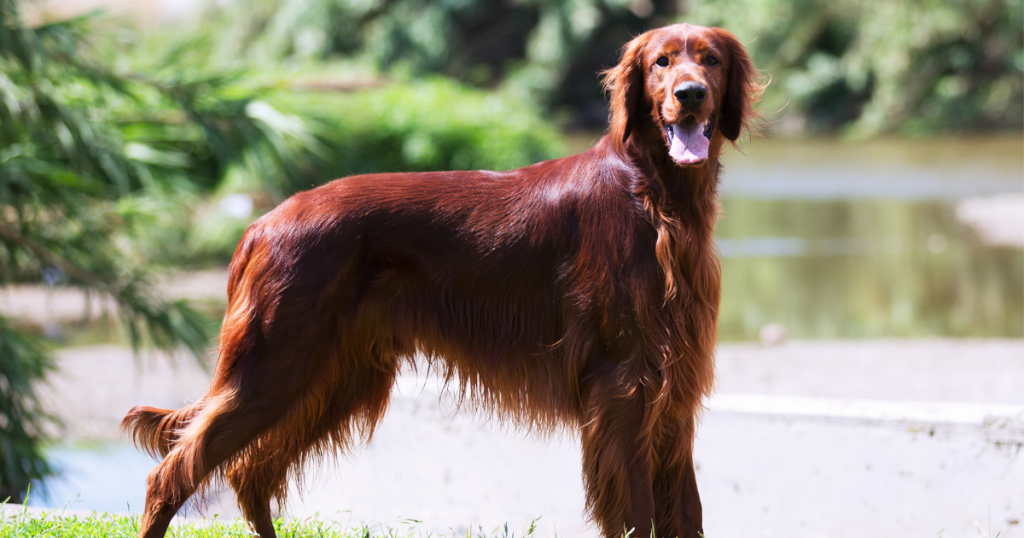
Pros:
- Irish Wolfhounds are naturally protective and patient.
- Their sensitivity allows them to attend to and improve their human’s mood.
Cons:
- Their lifespan is short (6 years or so).
- They weigh over 100 pounds.
12. Border Collies
Border Collies are widely regarded as one of the smartest and most hardworking dog breeds. Originally bred for herding sheep along the England-Scotland border, they are known for their intense focus, agility, and stamina. Border Collies thrive on mental and physical challenges, making them excellent companions for active families and those involved in dog sports or farm work. Their keen intelligence and eagerness to please require consistent training and plenty of exercise. With their striking appearance and boundless energy, Border Collies are loyal, loving, and endlessly impressive dogs.

Pros:
- They’re smart (like, Mensa smart), fearless, and affectionate.
- They’re devoted to their owners.
- This breed is known to be intuitive to feelings.
- They are one of the top champion breeds in canine competitions like agility.
Cons:
- Their sensitivity to sound can make them appear nervous.
- They have a high risk of eye issues and hip problems.
- They’re sometimes not great with children. (But, if herding your children into their bedrooms at night is your goal, look no further.)
13. German Shephards
German Shepherds are one of the most popular and recognizable dog breeds worldwide, known for their intelligence, courage, and strong work ethic. Originally bred in Germany for herding and guarding sheep, they have since become trusted police, military, and service dogs due to their trainability and protective nature. German Shepherds are loyal and devoted family companions who thrive on having a job to do. With their athletic build and keen senses, they excel in obedience, agility, and protection roles, making them both loving pets and dependable guardians.
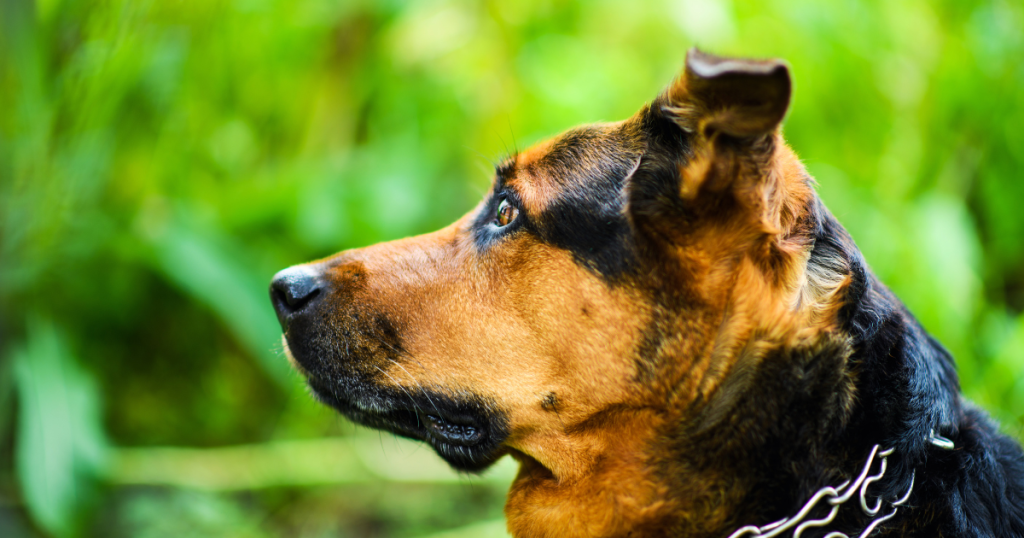
Pro’s:
- They are super intelligent, strong, and agile.
- They’re very protective and loyal.
- They adapt easily to their environment.
- They take their role as guard dog very seriously (can be a pro or con).
Con’s:
- They have high stamina and require a lot of outdoor time.
- They shed. A lot.
Another breed consideration? Rescued.
Adopt a dog that has been abandoned.
Rescue dogs are often mixed breeds. They can be just as loving, compassionate, loyal, and trainable as any dog breed, often without some of the “intense” identifying traits of pure breeds


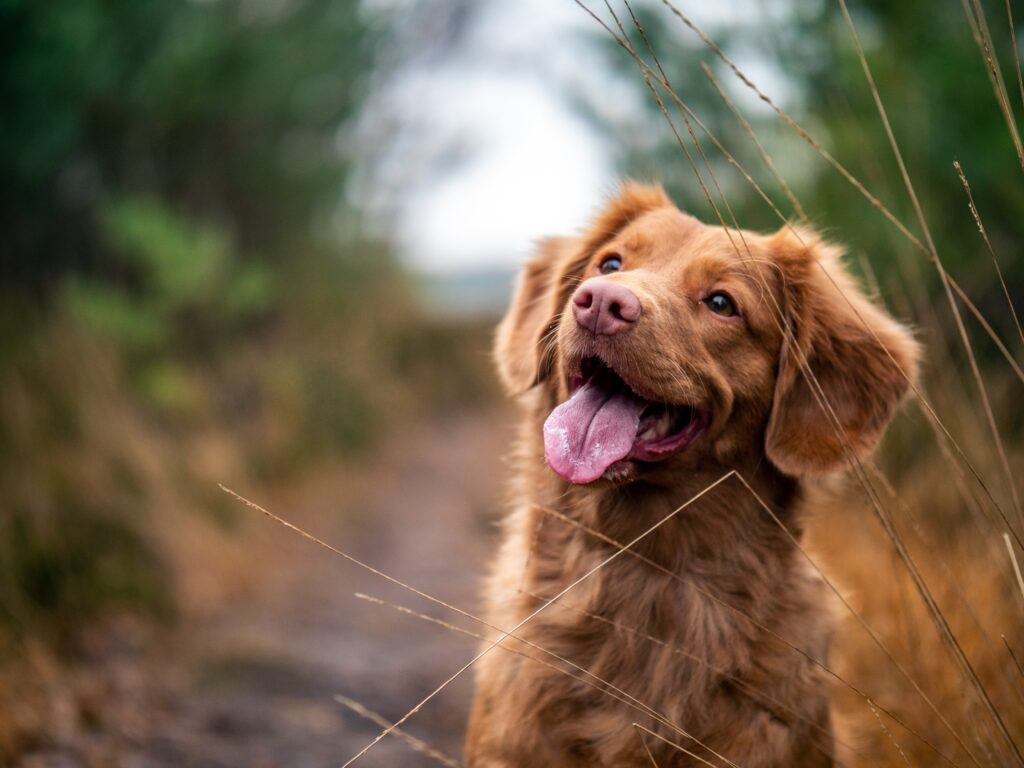
Breeds to Avoid
Even though any dog breed can technically provide emotional support to a person, certain breeds are less likely to fit the role.
For instance, Shar Peis may be loyal, but not cuddly or loving.

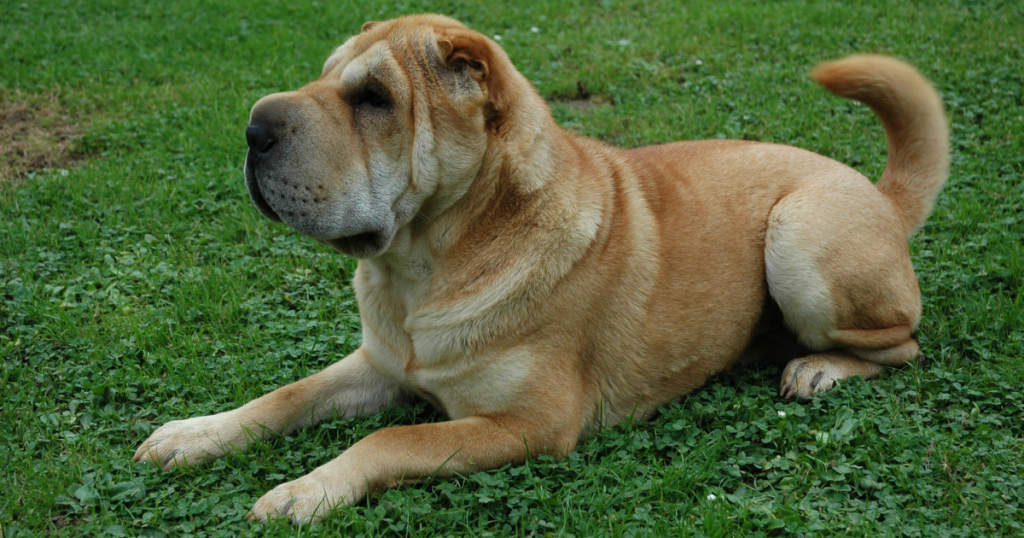
Other breeds such as the Shiba Inu and Pekingese have independent personalities and tend not to offer affection.
Emotional support dogs provide comfort and support
Emotional support dogs, unlike service dogs, are not required to perform any specific tasks for a disability. They’re meant for emotional stability and unconditional love.
As highly affectionate animals, dogs fulfill the role of providing support and love incredibly well.
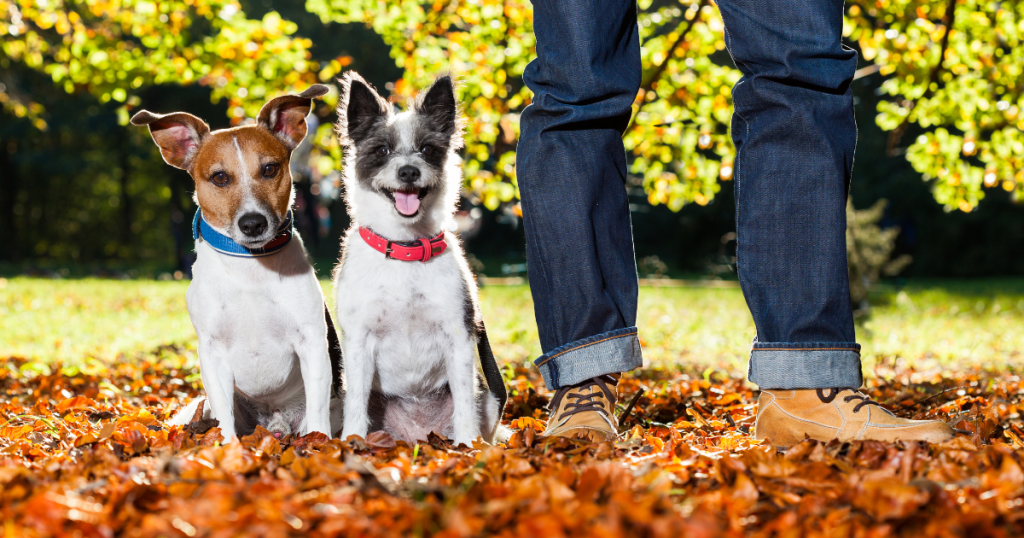
Giving and receiving affection and having companionship are parts of what makes for a meaningful, fulfilling life.
If you have anxiety or depression, consider speaking with your licensed mental health provider about an ESD. The benefits are enormous.
Imagine improving your mood, decreasing anxiety, feeling better overall, sleeping well, feeling more confident and comfortable, and improving self-esteem.
Seriously. Think about how that would change the course of your life.
And to be part of an inseparable duo with your best friend? Life is looking up just thinking about it!.
As the saying goes, “Imagine yourself to be the person your dog believes you are.”
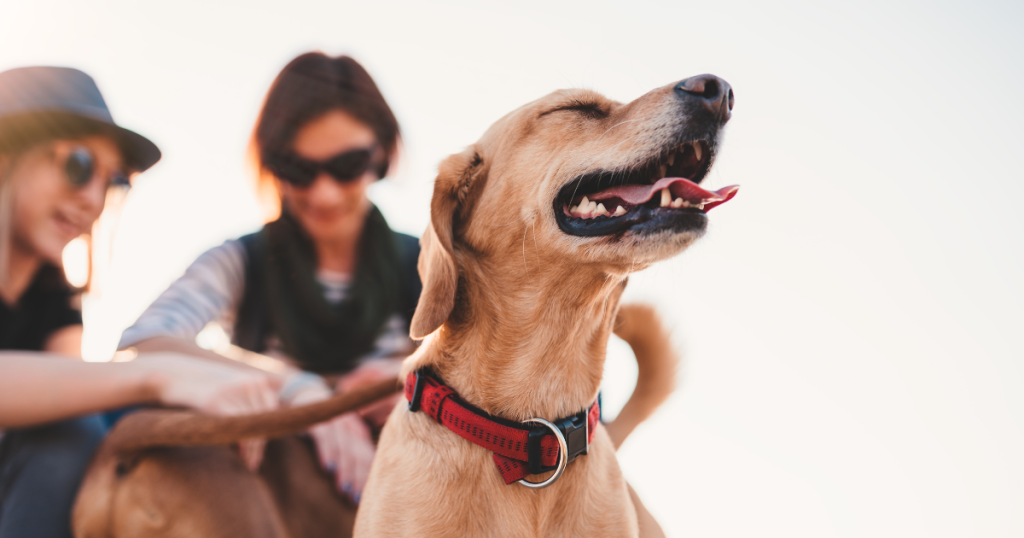
Dr. Elayne Daniels is a private-practice psychologist, international consultant, and coach. Over the last 25 years, she has helped people heal and deal with depression and anxiety. To learn more about how she might help you, contact her here.


